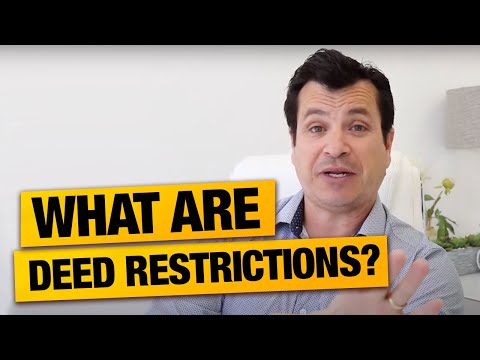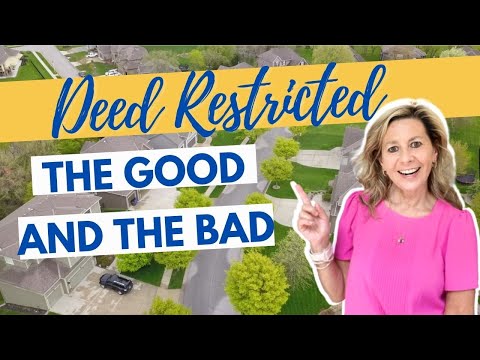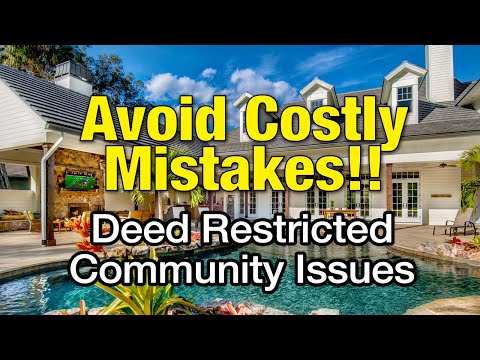Exploring What is a Deed Restricted Community
Understanding Deed Restrictions
In case you’re wondering, “what is a deed restricted community?” – buckle up as we sail down this edifying path together. A deed restricted community is a development where all property comes with terms and conditions typically focused on upkeep and usage, enforced by a homeowners association (HOA). Deed restrictions stipulate, or limit, how homeowners can use their property, based on the official property records of the home.
But here’s the nitty-gritty: Deed restrictions are clauses included in your home’s deed that limit how one can utilize their property. Whether you can’t build a shed in your yard, put up neon exterior paint, or maybe, own certain breeds of dog – that’s a deed restriction playing it’s part. They primarily sprout from an HOA, the builder of the home, or a local governing body.
The Role of Deed Restrictions in Property Development
Let’s peel back the layers of the property development onion and see what deed restrictions have to do with it. They are most commonly used types of encumbrances on a property, informing what can be built on a slice of land or what a property can/cannot be used for. Furthmore, these restrictions can apply to one particular property or a subdivision of properties, regardless of who owns them.
Traditionally, developers and condominium associations find deed restrictions handy when placing limits on aspects like home size or acceptable aesthetic choices. They function as a mechanism to maintain a unified aesthetic look or prevent properties from being used for purposes that might disrupt the harmony of the community.
Deed Restricted Community: An Example
A prime example of a deed-restricted community is found in regions benefiting from initiatives like the Disney magic key pass. Economically, these areas thrive on tourism and have deep-rooted interest in maintaining a specific image to lure visitors.

Delving Deeper: The Mechanics of a Deed Restricted Community
Deed Restrictions: Deciphering the Clauses
While deed restrictions often draw mixed reactions due to their limiting nature, understanding the clauses stitched into them is the first step to comprehend it. If you’re thinking, “what is deed restricted?” remember it’s not some old voodoo curse-it’s just clauses you need to understand.
Essentially, they offer guidelines on what can/cannot be done with a property. These guidelines extend to architectural design, landscaping, type and number of vehicles, and sometimes other specific activities like commercial usage, type of pets, or holiday decorations.

The Forces behind Deed Restrictions
In deed-restricted communities, enforcing the deed restrictions is primarily tasked to the homeowner’s association or the HOA. They act as the watchmen of the community, ensuring each homeowner abides by the property guidelines.
That’s right – the HOA has the power to enforce these restrictions, sometimes issuing warnings, fines, or even taking legal action to ensure compliance. If your dream of owning bird Dawgs is turned down by the HOA, well, that’s just the way the cookie crumbles.
Understanding the Scope and Applicability of Deed Restrictions
The coverage and applicability of deed restrictions depend purely on the clauses set by the HOA and are agreed upon by the homeowner at the time of purchase. Once established and agreed upon, these restrictions run with the land, implying they are binding on any future owners of the property, or until they are legally canceled or expired.

| Subject Matter | Detailed Information |
|---|---|
| Definition | A deed restricted community is a development where all property comes with conditions put into place and enforced by a homeowners association (HOA). |
| Purpose | These are typically used to maintain a certain appearance and functionality within the community. |
| Common Restrictions | They can restrict a variety of things, like what can be built on a property, acceptable exterior paint colors, owning a certain breed of dog, and even the building of a shed in the yard. |
| Origin of Restrictions | Restrictions can be applied by several entities: an HOA, the developer of the home, or a local governing body. |
| Area of Applicability | They can apply to one specific property or a subdivision of properties, regardless of who owns them at any point in time. |
| Removal of Deed Restrictions | This process requires consent either from the governing body that set them or from other parties involved in the restriction and can be a difficult process. |
| Benefits of Deed Restricted Communities | They maintain a consistent aesthetic within a neighborhood and can possibly increase property value. They also ensure no unwanted businesses or structures are erected in the area. |
| Drawbacks of Deed Restricted Communities | They limit personal freedoms in terms of property use and may require regular communication and compliance with HOAs. |
5 Shocking Things You Need to Know About Deed Restricted Communities
The Inevitable Presence of a Homeowners Association (HOA)
One salient feature of a deed-restricted community is a power-packed HOA. They are like the cock of the walk in these communities, holding the master key to the enforcement of the deed restrictions.
Curbing individual Aesthetic Choices: The Downside of Deed Restrictions
Let’s call a spade a spade – deed restrictions can sometimes curb your aesthetic freedoms, like the use of specific exterior paint colors or style of sexy yoga pants draped over your balcony railing. These restrictions aim to maintain a consistent feel and look across all property in the community.
Residential Restrictions that Might Surprise You
Inside the deed-restricted communities, there are some residential restrictions that might just surprise you. Restrictions may extend to types of window coverings, maximum height of the grass in the yard, prohibition of home businesses, or limiting the number of cars parked on one’s driveway.
Deed Restrictions are Not Immutably Rigid
Surprise! Deed restrictions aren’t as rigid as you think. While removing them isn’t a piece of cake, it’s not impossible either. It requires obtaining consent, either from the governing body that set them or from the other parties involved in the restriction, such as neighbors.
Usage and Upkeep: The Double-Edged Sword of Deed Restrictions
While deed restrictions can feel limiting marked by restricted use, they also assure that properties maintain a certain standard of upkeep, which can prevent a decline of aesthetic appeal and property values.

Dealing with Deed Restrictions: What You Can Do
The Road to Obtaining Consent
Removing a deed restriction needs consent, and obtaining consent can be like threading a needle in the dark. Usually, you’ll need to get an agreement either from the power that set them – your local government or HOA, for example – or from the other parties involved in the restriction, like neighbors.
What is Deed Restricted: Exploring Possible Exemptions
As you ponder, “what is a deed restricted community?” you might also marvel at the possibility of exemptions. Although rare, waivers may be granted in some specific cases with a majority agreement.
Using Deed Restrictions to Your Advantage
While restrictions may sound daunting, fear not. They can also be turned to your advantage. Deed restrictions help maintain a unified neighborhood aesthetic, which likely assures appreciating property values, resulting in a great gross rent multiplier.

A Bite of Reality: Life in a Deed Restricted Community
The Deed Restricted Community Experience: Tales from the Inside
Living in a deed-restricted community is like stepping into a neighborhood right out of a storybook – clean, well-curated landscaping and identical homes all in a row. But the nitty-gritty lies in the stringent rules that may sometimes feel too generic and impersonal.
Key Considerations Before Moving into a Deed Restricted Community
If you want your home to mirror your personality, get to bird dogging meaning before moving to a deed-restricted community. Grasping your unique needs, preferences, and personal lifestyle are crucial considerations.
Deed Restricted Communities: The Trade-offs
Life in a deed-restricted community comes with a platter of trade-offs. Yes, they may limit your freedom of expression across your property, but they also maintain consistency, uphold property values, and can create a pleasant and harmonious living environment.

Wrapping it Up: The Deed is in the Details
Reflecting on Deed Restricted Communities: The Good, the Bad and the Unexpected
So, what is a deed restricted community? It isn’t one size fits all answer. They have their good points – maintained aesthetics, potential property value appreciation, and a harmonious living standard. Still, they also come with restrictions and limitations that some homeowners may find too strict or impersonal.
The Future of Deed Restricted Communities: A 2024 Perspective
As we gaze towards the future, deed-restricted communities’ landscape seems promising yet challenging. Buyers who value harmony and uniformity in their neighborhood are expected to gravitate towards these communities, driving the market trends. The question, “what is deed restricted?” is likely to be an increasing concern in What Does Mls stand For in real estate searches.
Though they’re not everyone’s cup of tea, understanding deed restricted communities, their restrictions, and how they affect your homeownership experience is essential if you’re considering buying property in one. Your understanding will ensure that your new home is comfortable and suits all your needs. Remember, the key to peace of mind lies not only in the mortgage details but also in the deeds.
What is the most typical purpose of a deed restriction?
Oh boy! The usual purpose of a deed restriction? It’s typically to preserve certain desirable characteristics of a property, like maintaining a uniform aesthetic vibe or the nature-loving appeal of a residential subdivision, for instance. These can influence, in a big way, how you can use your property.
Which of the following is an example of a deed restriction?
Hmm, an example of a deed restriction, right? Picture this: a rule saying you can’t repaint your adorable suburban house in neon colors – not a vivid vision you were hoping to enjoy, huh? That’s a common type of deed restriction.
Can you get around deed restrictions?
Can you finagle your way around deed restrictions? Well, technically, no but you might be able to change or remove a restriction. However, keep in mind, it’s usually an uphill battle, so lace up your legal boots.
What does deed restricted community mean in FL?
Deed-restricted community in Florida, what’s that mean? Well, it typically means the hood follows certain rules regarding property use, maintenance, architecture and so on – a bit like a well-regulated beehive, if you get my drift.
Who usually creates deed restrictions?
Who’s usually behind deed restrictions? It’s generally the original developer or subdivision owner. They’re like the puppet masters, setting the strings for the property use.
Who enforces deed restrictions when there is no HOA Texas?
Who enforces deed restrictions when there isn’t an HOA in Texas? Now that’s a bit tricky. Typically, it’s up to the individual property owners within the subdivision to put on their sheriff badges and enforce the rules.
Which of the following is not a type of deed restriction?
Which isn’t a type of deed restriction? Well, folks, that can be anything – like a restriction banning you from adopting extraterrestrial life (if they exist!). Sounds weird, but hey, it’s not unheard of.
What is the name for the limitations usually imposed on property in newer subdivisions?
Hmm, the name for limitations usually imposed on property in newer subdivisions? They’re often known as “restrictive covenants.” Sort of a legal lingo for rules of the land, eh?
What is the meaning of pendens?
The meaning of pendens? It’s Latin for “pending action” – smells like a courtroom drama, doesn’t it? This usually relates to terms around property law and real estate.
What is the difference between deed restrictions and restrictive covenants?
Difference between deed restrictions and restrictive covenants? Well, they’re pretty much two peas in a pod. But, in a nutshell, deed restrictions apply to a single property, while restrictive covenants typically apply to an entire subdivision.
How do you get around restrictive covenants?
How to get around restrictive covenants? Similar to deed restrictions, getting past these could be tough. However, a well-worded lawsuit or a friendly agreement with the other homeowners could do the trick – but it’s a rare bird.
Who can enforce deed restrictions in Ohio?
Who enforces deed restrictions in Ohio? The HOA, or if one isn’t present, the property owners in the neighborhood. They’re the ones wearing the judge’s hats in such a situation.
How long do deed restrictions last in Florida?
How long do these pesky deed restrictions last in Florida? They typically run with the land, meaning they stick around for good. Feels like forever, doesn’t it?
Who enforces deed restrictions in Florida?
Who enforces deed restrictions in Florida? Usually, it’s the responsibility of the community’s HOA. If there isn’t an HOA, then it’s the individual property owners playing the sheriff’s role.
Can deed restrictions be changed in Florida?
Can deed restrictions be changed in Florida? Yes, but it’s not as easy as a walk in the park. It usually requires a significant majority vote from the property owners or a court decision.
What is the purpose of a deed restriction is to enable an owner to specify?
So the purpose of a deed restriction is to allow the owner to specify, what exactly? It’s usually to set the scene for how the property should be used and to protect the area’s general ambiance. Think of it as a director setting the tone for a movie.
What is a deed restriction used for quizlet?
A deed restriction on Quizlet? Well, they’re typically used to ensure the property is used in a specific manner and keeps up the status quo, you know, keeping things in check!
What are deed restrictions in real estate quizlet?
Now, onto deed restrictions in real estate on quizlet? Well, in simple terms, they’re rules that govern how a property in a given area can be used and developed.
What are deed restrictions also known as quizlet?
Deed restrictions are somewhat of a chameleon and are often known by other names, including “restrictive covenants” or “conditions, covenants, and restrictions” on Quizlet. Different names, same game!



